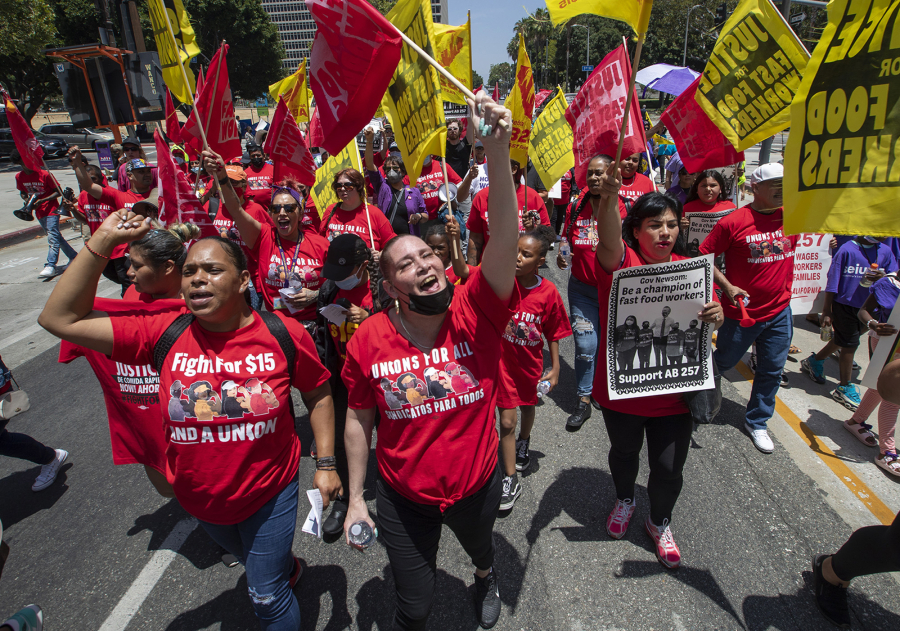When Jose de la Torre began delivering pizzas for Papa Johns in 2019, he made $15 an hour and shared a one-bedroom apartment in the Florence-Graham neighborhood of Los Angeles with half a dozen other people.
After two years on the job, his hourly rate was the same but his work schedule had been cut — to about 30 hours a week instead of the full 40, he said. Meanwhile, his everyday living expenses had gone up. He began sleeping in his Nissan Altima, parking it near the Papa Johns in Lynwood where he worked.
“I made the choice,” De la Torre, 53, said. “It was either my car and eat, or rent.”
De la Torre’s situation is not uncommon among fast-food workers, who make up 11% of all homeless workers in California and 9% in Los Angeles County, according to a report released Tuesday by Economic Roundtable. The nonprofit research organization estimated that there are 10,120 fast-food workers in California who are homeless.
Of the total homeless population, the group estimated that fast-food workers make up 5.9% in California and 5.2% in L.A. County. It said the median annual earnings of frontline fast-food workers — such as cooks, cashiers, food prep workers and dishwashers — was $14,949 statewide in 2020.
“The fast-food industry is a poverty employer, with a larger share of its workers in poverty than any other industry,” said the report, which was underwritten by the Service Employees International Union. “Raising the wage floor in this industry is the single most important step for reducing economic homelessness in the state.”
California is now home to more than 171,000 homeless individuals, according to the U.S. Department of Housing and Urban Development, a 6.2% increase since 2020.
The average hourly wage of fast-food and counter workers in California was $16.60 last year, according to the U.S. Bureau of Labor Statistics.
In addition to low wages, fast-food workers are hamstrung by part-time hours and unpredictable on-demand scheduling, the Economic Roundtable report said. Combined, that can create and perpetuate poverty and undercut workers’ ability to pay rent. A sudden change in employment or a large unavoidable expense can quickly push a worker into homelessness.
The nonprofit examined industrywide data from restaurant chains including McDonald’s, Starbucks, Burger King, Jack in the Box and Yum Brands (the parent of KFC, Taco Bell and Pizza Hut).
The fast-food industry benefits everyone but the workers, said Daniel Flaming, president of Economic Roundtable. Customers get cheap and efficient meals while the fast-food brands, which flourished during the pandemic, make billions of dollars annually.
“The profits are on the backs of workers who can’t keep their heads above water,” Flaming said. “The entire playing field needs to be raised.”
Founded in 1991, L.A.-based Economic Roundtable conducts research on environmental sustainability, affordable housing, employment and social equity. Flaming said the nonprofit received $35,000 from the SEIU to conduct the homelessness study and an additional $15,000 donation from the union.
De la Torre is still homeless today, a situation unlikely to change in the near future after he lost his job in March when the Papa Johns branch abruptly closed.
On Monday, Papa Johns said the Lynwood location had been owned and operated by a franchisee and that the Atlanta company “does not control or dictate independent franchisees’ employment activities, including hiring, termination and compensation.”
“As a company, Papa Johns believes that all of its team members should be fairly compensated with market competitive rates and in accordance with the law,” Papa Johns said in a statement. “We continue to expand benefits and our compensation plans.”
De la Torre said he is considering becoming a delivery driver for Uber Eats but hasn’t figured out a game plan yet. His hope is to be able to find a home again soon so his children know where he is and can come visit.
“It makes me really emotional because this is something that has never happened to me,” he said. “It’s a scary situation.”



